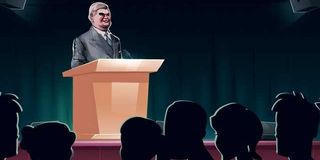Covid jabs: Birth of UK’s universal health coverage

As a Health minister in his country, Aneurin Bevan was invited by Grant Medical College to speak to medical students
Marie and I had our Covid vaccine today. We were invited for this as we had already received the first jab.
We found the arrangements as impeccable as last time, except, it was more multicultural than our last visit, when Marie and I had our first jab.
For example, the nurse who injected the vaccine into my left arm was an American, the usher an Australian and the person at the exit was surprisingly a Kenyan.
The multi-cultural nature of the vaccination centre represented the non-racial society we live in. I spoke to her in Swahili. For nosy people, I must add here and now that I picked it up from my patients. I was glad because I could still speak it fluently. It might be because my son and I have a secret code; we always count in Swahili dialect, because I have already forgotten a Iot of Indian languages like Marathi and Tuloo due to non-use. I would find them valuable if I ever travel to Southern India.
I forgot to write in my former article that both jabs were free. Thereby hangs a true tale:
After the Second World War, Clement Attlee, a post-war Prime Minister and leader of the Labour Party, was asked by the Queen to form a government since he had a majority of legislators in Parliament.
Health services
This was a surprise for the country as it was for conservative wartime leader, Sir Winston Churchill. This volte-face happened because the British are a pragmatic people.
Being a miner’s son, Aneurin Bevan, the Minister for Health, realised how difficult it was for poor people to get admitted to a private hospital simply because they could not pay a deposit. So, he made the health services free for everyone and called it the NHS, the National Health Service.
Soon after the war, Bevan visited India. As a Health minister in his country, he was invited by Grant Medical College (GMC) to speak to medical students. I was one of them. I remember to this day the topical statement that he made. I remember vividly what he said. Sweeping a lock of grey hair from his forehead, he roared. ‘The only war we are allowed is against poverty, ignorance and disease.’ He got a well-deserved applause for saying this common truth that has raked the brain of all the politicians in the developing nations.
I still remember the crowds that were present there. The large compound of GMC was littered with microphones and loudspeakers. The main lecture hall was full, not an empty seat in sight. The lecture hall was packed like sardines in a tin. Thank God, we arrived early and occupied front-seats from where we could see his gestures.
Having heard that memorable speech and having viewed all his body-language, my friends unanimously voted that the Welsh-man had strayed a long way away from his roots.
I did not want to write this, but I must, to complete the records. I find it sad to give an account of Bevan’s death. I know the cause of his death. To put the record straight, he died of stomach cancer on July 6, 1960, aged 62.
Malignant tumour
A notice appeared in the Times of London with a photograph showing Nehru, the first prime-minister of independent India, Vijya-laxmi Pandit, the first Indian High-commissioner to Great Britain, and Bevan and Mrs Bevan, with Nehru saying final, fond kwaheri to an emaciated personal friend, emaciated, due to a malignant tumour in his stomach.
As a matter of fact, the NHS has proved its worth during the Covid-19 pandemic. Despite many doctors and nurses losing their lives in the line of duty, they provided excellent patient care to Covid-19 patients.
The NHS is so stuck to the British psyche that no government, whether Labour or Tory, dares to change it despite costs escalating due to new drugs and a rise in the number of MRIs and CT scans. This is a legacy that Aneurin Bevan can be proud of.





